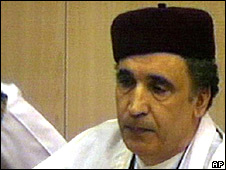Abdelbaset Ali al-Megrahi’s controversial release
 I am completely torn over the highly contentious decision to release on compassionate grounds Abdelbaset Ali al-Megrahi, otherwise known as the “Lockerbie Bomber”, convicted in 2001 for the murder of 270 people in the Lockerbie terrorist atrocity. al-Megrahi was the only person ever to be brought to justice for the outrage and has always denied any involvement. Whether this is true or not is not important.
I am completely torn over the highly contentious decision to release on compassionate grounds Abdelbaset Ali al-Megrahi, otherwise known as the “Lockerbie Bomber”, convicted in 2001 for the murder of 270 people in the Lockerbie terrorist atrocity. al-Megrahi was the only person ever to be brought to justice for the outrage and has always denied any involvement. Whether this is true or not is not important.
The Scottish Justice Minister responsible for the decision faced a terrible dilemma. On one hand he had a reponsibility to uphold Scottish law regarding the release of terminally ill prisoners, regardless of the nature, scale or notoriety of their crimes. On the other hand he was under immense and almost unbearable pressure from the United States and the bereaved families of the victims. The UK government’s position on the matter is at this point unknown but it is widely believed that it will condemn the decision when parliament is recalled.
Of course, at the end of the day, while the United States is entitled to express an opinion on the matter, they had no control nor should they have expected to have any control over what happened to al-Megrahi. This was a crime that was committed on UK soil and so from start to finish had to be dealt with using the UK and Scottish justice systems, regardless of the predominant nationality of the victims. One might also argue that the United States has no right to comment on the situation since it was largely the United States’ foreign policy which created the motivation for the attack in the first place. Just saying, like.
 The reaction of the Libyan government and public on the arrival of al-Megrahi in Tripoli after his release was absolutely abhorrent, however, regardless of whether or not he is truly guilty of the crimes for which he has been convicted. It was made very clear by both the UK and US governments that it would be inappropriate and very bad for diplomatic relations should Libya allow a “hero’s welcome” to take place, which it did anyway. It was distasteful and wrong and I believe that Colonel al-Gaddafi should and will suffer for it in some way. Indeed, a royal visit to the country is already being reconsidered.
The reaction of the Libyan government and public on the arrival of al-Megrahi in Tripoli after his release was absolutely abhorrent, however, regardless of whether or not he is truly guilty of the crimes for which he has been convicted. It was made very clear by both the UK and US governments that it would be inappropriate and very bad for diplomatic relations should Libya allow a “hero’s welcome” to take place, which it did anyway. It was distasteful and wrong and I believe that Colonel al-Gaddafi should and will suffer for it in some way. Indeed, a royal visit to the country is already being reconsidered.
Assuming for a minute that he is guilty, and I have to have enough faith in the UK justice system to believe that he is, I think it highly unlikely and therefore highly unfair that he was the only person brought to justice over an atrocity which quite clearly required the involvement of more than just one person. The investigation into the incident should have been more wide reaching and should have brought more people to justice. For this reason it is valid to argue that al-Megrahi has been made a “scapegoat” for the attack, with the world’s anger and rage focussed solely on him. But this does not mean that somehow the laws of the country in which he was brought to justice and imprisoned did not apply to him. He was entitled to apply for and be granted release from prison on compassionate grounds just like any other prisoner in the UK. If we start making exceptions where do we stop? Where do we draw the line before the rights of prisoners become meaningless?
So I really don’t know what to think, it’s a difficult one. As a citizen of this country I feel I have to stand behind and have faith in its justice system, but at the same time I can appreciate the outrage and grief suffered by the families of the victims over what was the world’s worst terrorist atrocity before 9/11. Certainly, having salt rubbed into their wounds by the rapturous reception he received in Tripoli was both unnecessary and cruel and thoroughly undeserved, regardless of the decision to release him.
But does the rapturous reception really change anything? Does it tell us anything we didn’t already know? Can we _really_ be surprised at what happened?
We all know what many of the muslims in the east think of us in the west, that’s no secret. To some – in fact, to many out there – the man is a hero. They’re going to give him a hero’s welcome, because he’s a hero coming home. The fact that the supposed Devil of the west was kind enough to let him out is probably lost on them. To many others he is an innocent man made a scapegoat of (the latter is definitely true, we can’t be 100% sure on the former). We must also remember that the media out there are very unlikely to be unbiased… we don’t know how the whole deal has been portrayed to them.
Consider it for a moment, from Colonel Gaddafi’s point of view. There _will_ be a demonstration of pride, heroism and the feeling of justice being done and the West conceding their mistake when he returns, there’s nothing he can do about that. If Gaddafi wants to stay in power, though, he’s going to have to allow some of this to go on. It’s either that or get ‘elected out’ – probably with a bullet. The best he can do is to allow some of this to go on and keep an official silence, which it seems is what’s going on.
I think they were right to set him free. He’s served effectively a life sentence. He’ll have very little quality of life for the remaining few months, I say show him compassion. Let him sort out his affairs before he dies, and let his family come to terms with his death now – he may be a monster to the west, but he’s still a human being to them. Would they do the same for us? Probably not, but that’s not important. If we all lived by the standards of others, what kind of world would we live in?
I think its difficult to read into the reception he received in Tripoli. We are quick to perceive it as a celebration, a welcoming home of a hero, lauded for what he accomplished. Maybe its a celebration, welcoming home an innocent man? I’m guessing the Libyans consider him innocent. The conviction was not, is not solid. There are grounds for appeal. What I want to know, what everyone should want to know, is who benefits from that appeal being dropped. Not Al-Megrahi who has always maintained his innocence. And sure as sherlock not the SNP.
I appreciate reading considered views like this. But I love your tweets ;)